TRN412H1
TRN412H1: Seminar in Ethics, Society, and Law
For the 2024-2025 academic year, there are five sections of TRN412H1.
TRN412H1-F LEC0101: Seminar in Ethics, Society, and Law – Our Failed War in Afghanistan
Course Description
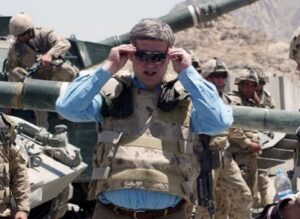
Assessment: early 2pp research proposal on selected topic (~15%); <10min presentation on topic (~20%); end-of-term essay on topic (~15pp, ~45%); class participation (~20%). Also open to senior IR students.
2024-2025 Instructor
|
John Duncan John Duncan is an associate professor and the director of the University of Toronto’s major program in Ethics, Society and Law (we say “E, S AND L”) hosted by Trinity College. ES&L enrolls seventy-five new students from more than five hundred applicants annually, and features small seminar courses, innovative programing, a focus on sustainability, and more traditional courses. Professor Duncan is also the academic director of the Ideas for the World program at Victoria College in the U of T. His interests include outreach and engagement co-learning (please see, e.g., “Humanities for Humanity”), critical issues in contemporary society, politics, and international relations (please see, e.g., “Three NATO gambles in Ukraine” and “The war that never left Afghanistan“), and the history of philosophy and the humanities (please see, e.g., Rousseau and Desire, “Sartre and Realism-All-the-Way-Down“, and “Frankenstein’s Message: Life Without Love is Monstrous“). He is involved in peace research and directs the Humanities for Humanity programs at Trinity. For more information, please see his web presence on Academia.edu. |
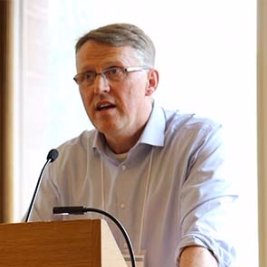 |
TRN412H1-F LEC0201: Seminar in Ethics, Society, and Law – Freedom of Expression, Harmful Speech, and the Law
Course Description
In this course we examine the legal status of harmful speech. Specifically we look at cases where freedom of expression leads to tangible harms to other people. A central question for the course is why words that wound should enjoy more protection than actions that cause damage? If someone strikes you with their fist, this would obviously be criminal. Why is it different when someone strikes you with their speech? Scholars have given many answers to this question and we will study the different ways that countries have tried to balance the interest in freedom of expression with the the interest in reducing harm, especially to already vulnerable parties. The goal of the course is to allow students to bring theoretical foundations to current issues related to the limits of freedom of expression. Students will produce research papers over the course, and will also be given the opportunity to develop their presentation skills.
2024-2025 Instructor
|
Michael Kessler Michael Kessler is an Associate Professor in the Ethics, Society & Law Program at Trinity College. He is the Raymond Pryke Chair and Director of the Margaret MacMillan Trinity One Program. He was an undergraduate at the University of Toronto where he studied philosophy before moving to Harvard University for his doctoral studies. His research interests are in philosophy of law, bioethics, and criminal justice. In his spare time he spends a lot of time on bikes and with dogs. |
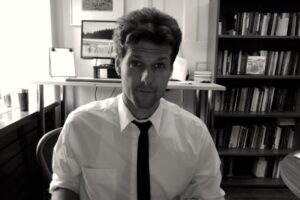 |
TRN412H1-S LEC0101: Seminar in Ethics, Society, and Law – Social Justice Policy in Ontario
Course Description
Governments of all stripes in Canada will argue that the policies they propose and implement are designed to advance the best interests of their citizens. Most often, there are no objective criteria built into policies that could allow analysis of the success of these claims. In this section of TRN412H, we will discuss policies designed to foster social justice in the Ontario context over the past 20 years and the degree to which we can agree that they were successful. We will examine changes to the publicly funded education system between 1995 and present day; progress of reconciliation with Indigenous people in the context of the recommendations of the Truth and Reconciliation Commission; poverty reduction initiatives and particularly the Basic Income Pilot; and finally, issues of equity and inequality that have been thrown into sharp relief by the COVID pandemic and the subsequent economic volatility.
The instructor will draw on her experience as an elected official in Ontario from 2000-2022 to augment and foster discussion. Students will be expected to complete assigned readings but additionally, to bring relevant policy discussion items from current media.
2024-2025 Instructor
|
Kathleen Wynne Kathleen Wynne was Ontario’s 25th Premier. She was first elected to the Ontario legislature in 2003 as the MPP for Don Valley West, and she became the leader of the Ontario Liberal Party in January 2013. Kathleen has dedicated her professional life to building a better province for the people of Ontario. She and her government were guided by the values and principles that knit this province together: fairness, diversity, collaboration and creativity. Kathleen has served as Ontario’s Minister of Municipal Affairs and Housing, Minister of Aboriginal Affairs, Minister of Transportation, Minister of Education and Minister of Agriculture and Food. In her role as Minister of Aboriginal Affairs, Kathleen worked in partnership with First Nations communities to address issues such as mining development, First Nations land claims, and improving quality of life for Indigenous people living off-reserve through affordable housing and recreation programs. As Minister of Education, Kathleen led the government’s efforts to reduce class sizes, implement full-day kindergarten and provide more opportunities for high school students to reach their full potential. Kathleen has served as a Public School Trustee in Toronto. She has led citizens’ groups in a number of grassroots community projects, and has played a major role as an organizer and facilitator. This experience has contributed to her results-based approach to life, government and community. Kathleen has three adult children, Chris, Jessie and Maggie, and six grandchildren, Olivia, Claire, Hugh, Violet, Arthur, and George. Before moving to Alliston, Ontario, Kathleen and her partner Jane lived in North Toronto for more than 30 years. |
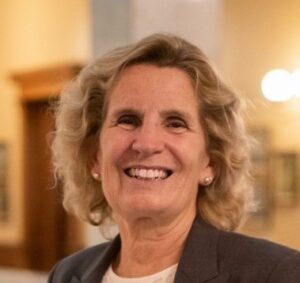 |
TRN412H1-S LEC0201: Seminar in Ethics, Society, and Law – Constitutional Democracy: The Theory & Design of Modern Governance
Course Description
Constitutional democracy is the predominant form of modern governance and political life. Almost every country in the world has some form of constitution and—by explicit declaration, substantive commitment, or pretence—each aspires to some form of popular rule. But the union of constitutionalism and democracy is beset by tensions—between popular will and minority rights, the rule of the people and the rule of law, the claims of the present and the commitments of the past. This course explores the theory and design of constitutional democracy. It proceeds by examining the philosophical foundations and component institutions of constitutional self-government, culminating in a collaborative constitutional convention addressing the challenges of structuring political life together.
2024-2025 Instructor
|
Connor Ewing Connor Ewing is assistant professor of Political Science and Fellow of Trinity College at the University of Toronto. Located in the fields of American Politics and Public Law, his research interests span American political thought and development, constitutional law and theory, federalism, rights jurisprudence, human dignity, and constitutional design. Previously he was a Kinder Institute Assistant Professor of Constitutional Democracy and Assistant Professor of Political Science at the University of Missouri and, before that, a Postdoctoral Research Associate in the Program on Constitutionalism & Democracy at the University of Virginia. He received his PhD in Government from the University of Texas at Austin, AM in Social Sciences from the University of Chicago, and BA in Philosophy and Political Science from the University of Wisconsin—Madison. |
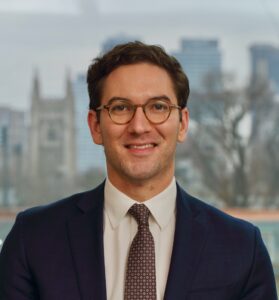 |
TRN412H1-S LEC0301: Seminar in Ethics, Society, and Law: Double Standards in Law, Society, and the International Environment
Course Description
Double standards, which refer to the application of different sets of principles, rules, norms, or laws to similar situations, are ubiquitous at all levels of human interaction. They are observed in both domestic and international governance structures. Evidence, or even the perception of double standards or hypocrisy, affects perceptions of fairness and legitimacy. But also, accusations of such duplicity can be used to deflect justified criticisms or evade accountability. While evidence of double standards is ever-present throughout history, they are currently receiving heightened attention as a manifest source of unfairness. Debates about disparate international reactions to foreign wars, global income inequality, policing and the criminal justice system, workplace expectations and the gender pay gap, or the treatment of asylum-seekers from different regions of the world all feature evidence and critiques of double standards.
This seminar delves into the complex phenomenon of double standards, exploring their practical manifestations and ethical implications in socio-legal and political contexts. Students will examine how double standards arise in various settings, from international relations and human rights to domestic policy and everyday social interactions. Through case studies, interdisciplinary readings from law, literature, social psychology, behavioural economics, and philosophy, and robust classroom discussions, the course will address such questions as: what ethical and legal principles are compromised by double standards? How do power dynamics and social structures perpetuate these inconsistencies? What are the consequences for justice, equity, and trust in societal and legal institutions? And, perhaps less intuitively, are double standards ever necessary to ensure the effectiveness and function of these institutions?
The overarching objective of the seminar is for students to gain a nuanced understanding of how prevalent double standards are in domestic and international environments. They will learn strategies to identify, critique, and assess double standards. While exploring the impact of double standards on justice, equity, and trust in institutions, students will develop strategies to mitigate the effects of double standards in various contexts. Assessment will be based on: (i) a research proposal, (ii) leading an in-class discussion, and (iii) a final research paper.
2024-2025 Instructor
|
David Hughes David Hughes teaches in the Ethics, Society & Law program at Trinity College, University of Toronto and in the first-year program at Osgoode Hall Law School. From 2022-2024, he was an Assistant Professor at the Canadian Forces College. Before that, he was the Trebek Postdoctoral Fellow at the University of Ottawa. He holds a PhD from Osgoode Hall Law School during which time he spent two years at the University of Michigan Law School as a Grotius Research Fellow. David has written about various topics and themes relating to international law which have appeared in several leading journals including the Harvard Journal of International Law, the European Journal of International Law, the Georgetown Journal of International Law, the Melbourne Journal of International Law, and the Vanderbilt Journal of Transnational Law. His publications can be found here. Before beginning his doctoral research, David worked at the Council of Europe, with the UN High Commissioner for Refugees, and with civil society organizations in Strasbourg, Geneva, Brussels, and Jerusalem. |
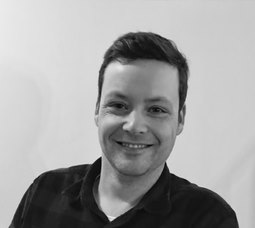 |